Welcome to Carrots! I'm so glad you're here. This is where I share thoughts on liturgical living, faith, parenting, culture, and an extra dose of Jane Austen. You can sign up for my email newsletter here to stay in touch, or look me up on Instagram!

image: Jennifer Ehle in ‘Pride and Prejudice’/Image © BBC
Every time I re-read Miss Austen’s novels (ahem, every single year), I find something I hadn’t noticed before. I uncover another layer with each return to her works and this year what I’m most drawn to is the theme of self-knowledge. I’m not alone in considering Austen to be a philosopher and she follows in the footsteps of the ancients in urging her reader to “know thyself.”
Why would Austen care so much about being self-aware? Does it really matter? Why yes, it does.
Without self-knowledge it’s almost impossible to grow in virtue. It would be like trying to go to confession without having the ability to examine your conscience. Without the clarity and honesty to know ourselves, we can’t conquer our flaws and become mature people who are able to love others well.
I think we all know someone who decidedly lacks self-awareness. Perhaps it’s the melodramatic Facebook friend who is always publicly complaining about people who cause drama or the gossip who rails about someone who talked about her behind her back. And Austen crafts such characters perfectly.
From Elizabeth Bennet to Henry Crawford to Emma Woodhouse, character after character is revealed to have been seeing themselves not as they truly are, but as a facade of themselves. Some of them are able to unmask themselves, but others, like Lydia Bennet, for instance, never develop self-knowledge.
“Well, mamma,” said she, when they were all returned to the breakfast room, “and what do you think of my husband? Is not he a charming man? I am sure my sisters must all envy me. I only hope they may have half my good luck. They must all go to Brighton. That is the place to get husbands. What a pity it is, mamma, we did not all go.”

After all the scandal and pain she’s caused, she can still make a statement like that. Classic Lydia in serious need of some self-knowledge.
What does Austen teach us about being honest with ourselves about who we are? Although all of the novels center around the theme of self-knowledge, this is a blog post and not a book, so let’s just talk about Pride and Prejudice and Emma. (And feel free to go crazy on the other novels in the comments and chat away about them.)
While Austen brings plenty of comedic material to the table in Pride and Prejudice with minor characters like the insufferable Lydia, or Mr. Collins, or Mrs. Bennet who completely lack self-awareness, the real drama is how the heroine and the hero of the novel come to change and know themselves.
In P&P Elizabeth Bennet and Mr. Darcy have been deceiving themselves. They both inhabit a world of their own imagination in which their assumptions and decisions are always right. But eventually their interactions with each other reveal their misperceptions about themselves.

When Elizabeth reads Darcy’s letter explaining his dealings with Mr. Wickham and his opposition to the supposed match between Jane Bennet and Mr. Bingley, she realizes that she has been reading all the events with a warped perception. It did not unfold at all as she imagined. She reflects, “Till this moment I never knew myself.”
While she still passionately disagrees with Mr. Darcy’s interference in Jane and Mr. Bingley’s relationship, she is floored that she is not the intuitive judge of human character that she thought herself to be. How could she be so taken in by Mr. Wickam and so prejudiced against Mr. Darcy? His letter makes everything clear. She trusted Wickam’s story because he flattered her and she was predisposed to see Darcy in the worst possible light because he had slighted her.

#shestolerableisuppose
Far from being an unbiased judge, Elizabeth had been letting her desire to be admired color her perception. But let’s not be too hard on her. Darcy is also quite flawed. He has fooled himself into believing that he always acts impeccably in light of the pride he should posses due to his place in society. But he’s taken it too far. His proper pride has been warped into arrogance and aloofness and it takes Elizabeth Bennet’s entrance into his life to help him see his error.
By the time they actually get together, they are both more humble, more self-aware, and all-around better human beings. Their love catapults them into not only self-knowledge but the virtue that should accompany it.
It’s very difficult to know ourselves in a vacuum. We need other people to help. And not just any community will do. We need those those willing to speak truth to us about ourselves. Elizabeth calls out Mr. Darcy for his arrogance. Darcy tells her the uncomfortable truth about her poor judgement and bias. And they’re both the better for it.

Like Pride & Prejudice, Emma also features a heroine who is desperately in need of self-knowledge. I have a soft spot in my heart for Emma (selfish know-it-alls need to stick together), but I also understand how she grating she can be and why some readers find her despicable.
It’s easy to see how she ended up so self-centered. Her widowed father has coddled her. Her dearest friend and governess Miss Taylor, while wanting the best for her, has failed to show Emma her flaws. Emma has had, as Austen tells us, “very little to vex her” during her privileged life and that’s poor soil for the development of good character.
In the beginning of the novel, Emma is almost delusional in her matchmaking attempts for her friend Harriet Smith. She’s completely misguided as to whether she’s leading her friend closer or farther away from happiness. And she sees herself as a selfless benefactress while in reality, she’s doing her friend no favors by interfering.

Being friends with ignorant and silly Harriet makes her feel superior while she ignores Jane Fairfax whose education and accomplishments threaten her and make her feel inadequate. By choosing the wrong community to invest in, Emma can maintain the facade that keeps her from truly knowing herself authentically.
Mr. Knightley, my favorite romantic lead of all Austen’s novels, is able to both see Emma’s flaws clearly and love her in spite of them. He sees not only who she is, but who she has the potential to be. And it’s his very selfless love and desire for her good that presents him with the uncomfortable task of pointing out her misbehavior at Box Hill.
The scene at Box Hill is one of the most poignant scenes in all of Austen. When Emma insults her spinster friend Miss Bates, she must face herself. She has not been kind and forbearing to those less fortunate, she has been selfish and flattered. Just as Elizabeth Bennet gains self-knowledge after reading Darcy’s letter. Emma comes to know herself when faced with her own thoughtless cruelty.
Where would Emma be without Mr. Knightley? Would she have carried on in her selfish delusions if he hadn’t spoken in charity and truth?

#badlydoneemma
In Emma, Austen shows us that shallow friendships are not enough to help us know ourselves. Deep relationships and real community are crucial. How can we see our flaws if we can always keep up facades with mere acquaintances? How easy it is to curate ourselves on social media in order to fool not only others, but ourselves. The people who interact with us daily for years are more difficult to fool. True community cannot be hoodwinked.
Love demands that we know ourselves in order to love others well. It requires not only selflessness, but clarity. And it motivates us to be our best selves–the people God created us to be. Love is a refining fire that, often painfully, reveals our flaws and more painfully burns those flaws away. For Emma Woodhouse, it’s Mr. Knightley’s love that prompts her to know herself and become a woman who can love others.

Austen often uses romance to lead characters to self-knowledge and make them worthy of the love they seek. But love doesn’t have to be romantic to teach us about ourselves and help us mature into people who can love more deeply and see more clearly. I have found motherhood to be just as enlightening as marriage in keeping me honest about my deepest flaws.
I can ignore my selfishness when meeting a new acquaintance for coffee, but I am faced daily with my flaws when parenting my children. My impatience and pride come straight to the surface and must be acknowledged and conquered. If we’re to know ourselves, our only hope is other people who love us and will serve as mirrors that clarify our misguided notions about who we think we are so we can mature into the people we are meant to be.
Self-knowledge and growth are necessary for a happy ending, not just to novels but to our story. If Austen were to answer the question, “How do you live a good life?” the answer might be, “Know thyself. And it never hurts to marry a gentleman who has a lovely estate and 10,000 a year.”
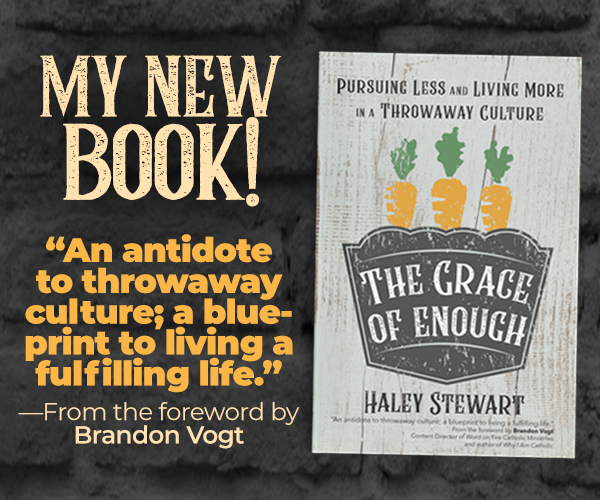
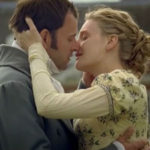

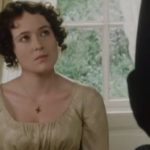
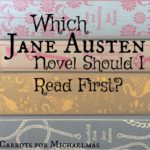
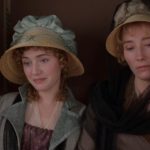
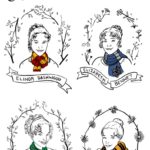
Haley, I love this!!!!! I had not thought much about this aspect of Austen’s work before, but you make excellent points, and I’ll be on the lookout for this next time I read an Austen book! I think it is splendid how you bring this back to the importance of a community and of holding each other accountable. So many times, fraternal correction gets a bad rap (or is ignored), but it is vital to growth as a person!
The images for this post were very well selected, too. Now I really want to watch that version of “Emma,” because I’ve only seen it once, but I loved it.
Thanks, AnneMarie! Fraternal correction is definitely tricky. But I always think of Mr. Knightley as a great example. He speaks out of concern and charity and after having developed a respectful and deep relationship with Emma.
And that’s my favorite version of Emma! The casting was perfect.
I love how you utilized these books to bring to light such an important issue for myself right now. It is TOO true how motherhood constantly keeps you aware of your flaws. At the same tIme, it is all too easy to attempt to ignore these bad parts of ourselves instead of facing them.
On another note…
My husband just happened to start reading Pride and Prejudice a few nights ago. I’m reading one of his favorite books, he’s reading one of mine.
I’m reading one of his favorite books, he’s reading one of mine.
Daniel read most of Austen’s novels a few years ago and it was really good for our marriage
Very nice, Haley. Your best writing yet. Thanks! I did not know it, but this is the exact message I hope my girls will glean from these movies.
Thanks, Neika!
oooooh! Yes! This is such a good post. And so, so true. In my old age I have come to see as well that you can’t really love someone until you know yourself and can take a step back and look at your motives, acknowledge your own shortcomings and see how you can help a relationship and when you’re just plain making things harder than they need to be.
And can we just take a moment and give a collective sigh of approval of Jonny Lee Miller as mr. Knightley? He is just perfection. I like to imagine that he’s sporting those big tattoos he has in real life under that dapper jacket from a secret stint in the Imperial Navy er, wait….is that odd? surely Im not the only one?
er, wait….is that odd? surely Im not the only one? 
Thanks, Heather! And YES. The most perfect of perfect castings. You’re not the only one! I thought Jeremy Northam was a great Knightley (and he was) but Miller is even better.
Ha! Haley, your hashtags are ON POINT.
Lovely. And it echoes (a bit) the message that our pastor gave this Sunday. (So obviously, if I’m hearing it twice…)
Thank you for this beautiful reflection!
Yes to everything! I love all the Austen novels, but Pride and Prejudice is just…what? Verdant with meaning? The bees knees? It’s so good. I love how well Austen goes into what marriage means and its function within the community, as well as what sort of marriage is best and why. I also wonder if Darcy and Elizabeth don’t stand in for an example of good religion too… like Darcy is the personification of “law” and Elizabeth is “spirit” and they start by not understanding each other or their own function or meaning, but eventually “justice and mercy kiss.”
Loved this, <3!
I loved this, both because I love Austen, and because I think the idea that having your flaws revealed (including parenting flaws) is not an occasion for continual self-criticism, but an opportunity to grow and mature. Thank you!
Self deception problem: smart, creative folks may often find clever and creative ways to fool themselves. Intellectuals are masters of rationalization. Most devastating scene in JA filmdom is the picnic scene in Emma with Gwyneth Paltrow slighting Miss Bates. Every time I watch it I hope that THIS time she won’t do it.
Beautiful post! I am so thankful for the people in my life who love me and are able to graciously tell or show me the truth about myself. Even though I am not a mother, little ones often seem to hold up the biggest, shiniest mirrors. My younger siblings, my scout group, and my high school students never fail to pierce my heart with their innocent and honest revelations. My students give me a double dose of self knowledge since I am teaching in a culture vastly different from my own. Not only do I get to see what I take for granted about myself, but I get a fresh perspective on the world as I know it as well. It’s intense. And it hurts. And it’s wonderful.
Mr. Knightley is my favorite of Austen’s leading men, too! (And on a side note, I’ve never seen that adaptation of Emma, and now I have to find it and watch it after all these glowing comments.)
I’m currently re-reading Sense & Sensibility (probably my first love in the world of Austen) and you could have written your entire post (as I’m sure you well know) with examples from the extremely self-aware Elinor and the eventually-brought-to-self-awareness-through-love Marianne. In the case of Sense and Sensibility, I love that Elinor is the one lovingly correcting her sister and that Marianne eventually realizes the worth of Elinor’s sensible conduct and resolves to be more like her. I think it beautifully illustrates your point that romantic love is not the only (or best) kind of refining love. Often, familial love is the most honest and enduring, and therefore, most effective kind to produce change.
Great post, Haley!
You might like this, from a series called Literary Portals to Prayer from ACTA Publications – Jane Austen: Illuminated by The Message http://www.portalstoprayer.com/austen/
Lots of other classic authors featured too (I did Alcott).
I totally married my Mister Knightley, and while it can be super vexing sometimes you’re right. He does see more of who I *could* be than I do myself.
Thank you so much – this is beautifully put! I’ve always insisted that Jane Austen’s novel’s can be like a road map for every woman at any point in her life. It’s funny how, having read and reread her books over the years, I always reinterpret her character’s actions in relation to …whatever I’m dealing with in my life. They’re timeless in that way.
Very happy that I am not the only one who reads the books every year!
You’re definitely not the only one!
I don’t know how I missed this one, but it’s awesome. Thankfully my sister in law shares my tastes in blogs and books so she told me to read it. Such insight into her work, so timely for me personally. Thanks!!
Aw, thanks, Liz!
Well done regarding comments on Emma. I abhored emma’s character as a teenager and so read and reread almost every other austen novel to death. On being stuck, unexpectedly, on a property in north-western queensland (australia) without my own book, the only novel to be had was Emma. After reading it as a fully-formed adult I adored it for exactly the same reasons you did. The transformative power of the ‘right’ love, the importance of investing in the ‘right’ community, and the consequences of knowing oneself in the ‘right’ way are all the things that Emma stumbled upon which I could relate to as an adult. She’s a lot more complex and interesting (+ genuinely kind) than I gave her credit for as a teenager. It’s easy to forget how young austen’s heroines were and I understand and love emma now, just as I understand and love my 34 y.o. self a lot more than my 14 y.o. one. Ironically, one of the other austen novels I have failed to read over as an adult is Mansfield Park so I’m really looking forward to reading that now after your comments. thanks!
Mr. Knightley is my favorite, too! While I do love Jeremy Northam, I think Mark Strong might have to be my favorite Mr. Knightley. And I also have a soft spot for Emma. I feel like her wake-up is more dramatic and personally jarring than even Elizabeth’s.
So in terms of self-knowledge, I think that’s a good argument for why Fanny Price is objectively the “best” Austen heroine, because she’s the only one who doesn’t have — doesn’t need to have — self-revelatory moment of introspection in her story. She remains unchanged by the events of her book; she is constant, incorruptible, and conversely in no need of “improvement” — there’s got to be a thesis on MP that somewhere, on a compare and contrast with the “improvements” being forever discussed by Rushworth, etc.
Similarly, although not quite actually, Anne Elliot claims not to be changed by the separation from Wentworth, claims she does not believe herself to have been wrong in being persuaded by her friend Lady Russell to turn him down, because it was prudent to do so at the time. Bit having secured her reward at the end, she vows not to endeavor to any other young person similarly situated. So, I think she’s full of it. She does have an aha moment of her own, not quite like Elizabeth’s or Emma’ but a change of perspective nonetheless.